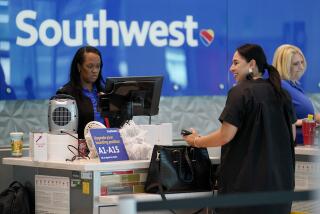U.S. dollar’s strength may keep hotel rates in check

Travelers wait in the lobby of the Ace Hotel in downtown Portland. Hotel experts predict hotel rates will rise only 5% this year, partly because hotel operators don’t want to scare off foreign visitors whose currency has lost value compared with the U.S. dollar.
- Share via
If you’re planning to travel this summer, the growing strength of the U.S. dollar may be keeping your hotel rates in check.
Demand for hotel rooms and airline tickets has been on the rise, thanks partly to strong consumer confidence. In fact, hotel occupancy rates are expected this year to reach 65.7%, the highest since 1981, according to a forecast from the accounting firm PricewaterhouseCoopers.
Hotels typically take advantage of strong demand by raising room rates. But the Pricewaterhouse forecast predicts hotel prices will rise only 5% this year, partly because hotels don’t want to chase away foreign travelers whose currency has recently lost value compared with the U.S. dollar.
“Average daily rate growth is expected to remain somewhat controlled for the balance of this year partly due to the impact of the increased value of the U.S. dollar,” the company wrote in its recent report.
The effect of the strong U.S. dollar on hotel rates will probably be felt most in so-called gateway cities that welcome many foreign visitors, said Bjorn Hanson, a dean at New York University’s Preston Robert Tisch Center for Hospitality, Tourism and Sports Management.
Another factor that is helping to keep rates from rising, he said, is the abundance of travel websites that let travelers compare hotel prices, thus putting pressure on hotel managers to compete.
“The average traveler checks seven sites before selecting a hotel,” Hanson said.
Industry analyst Alan Reay, president of Atlas Hospitality, said the strong U.S. dollar may reduce hotel demand and keep prices from soaring by tempting American vacationers to travel abroad to take advantage of the favorable exchange rates.
“I think that is a big dampening effect this summer,” he said.
To read more about travel, tourism and the airline industry, follow me on Twitter at @hugomartin.
More to Read
Inside the business of entertainment
The Wide Shot brings you news, analysis and insights on everything from streaming wars to production — and what it all means for the future.
You may occasionally receive promotional content from the Los Angeles Times.











